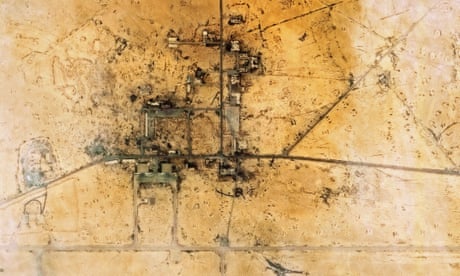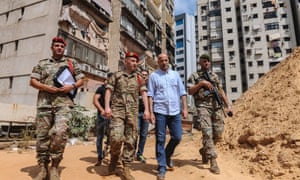A spokesman said the UN was unable to confirm the reports about Sunday’s incident, the latest in a series of reported attacks that have stoked a proxy conflict raging between Israel and Iran across the Middle East. “The United Nations calls on the parties to exercise maximum restraint both in action and rhetoric,” he said on Monday night. “It is imperative for all to avoid an escalation.”
Hezbollah’s leader, Hassan Nasrallah, said Sunday’s strike was Israel’s first such hostile action since the 2006 war. It was followed by another alleged Israeli attack yesterday on an armed Palestinian faction in eastern Lebanon, according to the group and Lebanon’s national news agency.
The Lebanese prime minister, Saad Hariri, told ambassadors from the UN security council’s five permanent members his government wanted to avoid a “dangerous escalation” of tensions, but that to do so would require the international community to reject Israel‘s “blatant violation”.
Lebanon’s president, Michel Aoun, a political ally of Hezbollah, said the Israeli strikes were “similar to a declaration of war” and that the country had a right to defend itself. “We are a people seeking peace not war, and we don’t accept anyone threatening us in any war,” he said. Israel’s military said it would not comment on either of the two alleged attacks.
A deepening confrontation between arch-enemies Iran and Israel has threatened further violence this month, as Israeli attacks have reportedly spread from Syria to Lebanon, and even as far as Iraq.
The target of Monday’s attack, the Popular Front for the Liberation of Palestine – General Command (PFLP-GC), is an ally of Hezbollah, Iran’s main proxy in Lebanon, and of the Syrian government, which is close to Tehran.
Abu Wael Issam, an official with the PFLP-GC, said the strike was carried out by Israeli drones and did not inflict any casualties. He said his group’s “alternatives are open in confronting the Zionist enemy” but did not specify.
Israel is concerned about Iran’s growing influence in the region and its ability to target the Jewish state as it spreads its own forces and alliedmilitia across war-torn Iraq and Syria. The US and the regional powerhouse Saudi Arabia have also sought to limit Tehran’s reach.

The Syrian airbase at the heart of a potential Israel-Iran war
In Lebanon, Iran has maintained a foothold for decades through Hezbollah, which fought a devastating month-long war with Israel in 2006. That war killed about 1,200 people in Lebanon, mostly civilians, and roughly 160 in Israel.
Since then, the once-volatile border between the two countries has been mostly calm under a tacit agreement largely interpreted as a way to avoid a repeat of the destructive conflict.
Instead, Israel has carried out hundreds of strikes in Syria, including on Hezbollah and other Iran-allied militia. Last year, Iranian forces retaliated by firing a barrage of rockets at Israeli military positions in the occupied Golan Heights, the first such direct attack of its kind.
The semi-covert fight heated up this weekend when the Israeli army said it had taken action in Syria to prevent an Iranian force from launching an attack on its soil with “kamikaze” drones armed with explosives.
Israel rarely acknowledges its attacks in Syria publicly. But according to a statement issued minutes after the army announced the strike, the prime minister, Benjamin Netanyahu, congratulated his military. “Iran has no immunity anywhere,” he said. “Our forces operate in every sector against the Iranian aggression.”
In less clear but potentially more consequential circumstances, the Hezbollah leader, Hassan Nasrallah, said on Sunday Israel had also launched a failed “drone attack” on his Shia movement’s Beirut stronghold.
“The time when Israeli aircraft come and bombard parts of Lebanon is over,” he said. “I say to the Israeli army along the border, from tonight be ready and wait for us. What happened yesterday will not pass.”
Addressing Israelis, he said: “Do not live, do not rest, do not be reassured, and do not bet for a single moment that Hezbollah will allow ... aggression of this kind.”
Hezbollah said both drones crashed and one damaged a media centre it runs in a residential building, causing “minor injuries”.
In a statement issued late on Monday, Hezbollah said that two Israeli drones which crashed in Beirut on Sunday were carrying explosives. The suburbs “were subjected to an attack by rigged drones”, it said, with the first one failing to cause a blast and the second exploding.
The Israeli army spokesman, Lt Col Jonathan Conricus, said the military had “listened closely to what Hassan Nasrallah said in his screaming and quite rampant speech”.
“We are alert. We … are left wondering whether Hassan Nasrallah really wants to drag Lebanon into fighting with Israel,” he said.
Israel’s military has acknowledged some of its attacks on Syria but has not spoken on the allegations it bombed Lebanon and Iraq.
The Associated Press contributed to this report
More people in India…
... like you, are reading and supporting The Guardian’s independent, investigative journalism than ever before. And unlike many new organisations, we have chosen an approach that allows us to keep our journalism accessible to all, regardless of where they live or what they can afford. But we need your ongoing support to keep working as we do.
The Guardian will engage with the most critical issues of our time – from the escalating climate catastrophe to widespread inequality to the influence of big tech on our lives. At a time when factual information is a necessity, we believe that each of us, around the world, deserves access to accurate reporting with integrity at its heart.
Our editorial independence means we set our own agenda and voice our own opinions. Guardian journalism is free from commercial and political bias and not influenced by billionaire owners or shareholders. This means we can give a voice to those less heard, explore where others turn away, and rigorously challenge those in power.
We need your support to keep delivering quality journalism, to maintain our openness and to protect our precious independence. Every reader contribution, big or small, is so valuable.

No comments:
Post a Comment